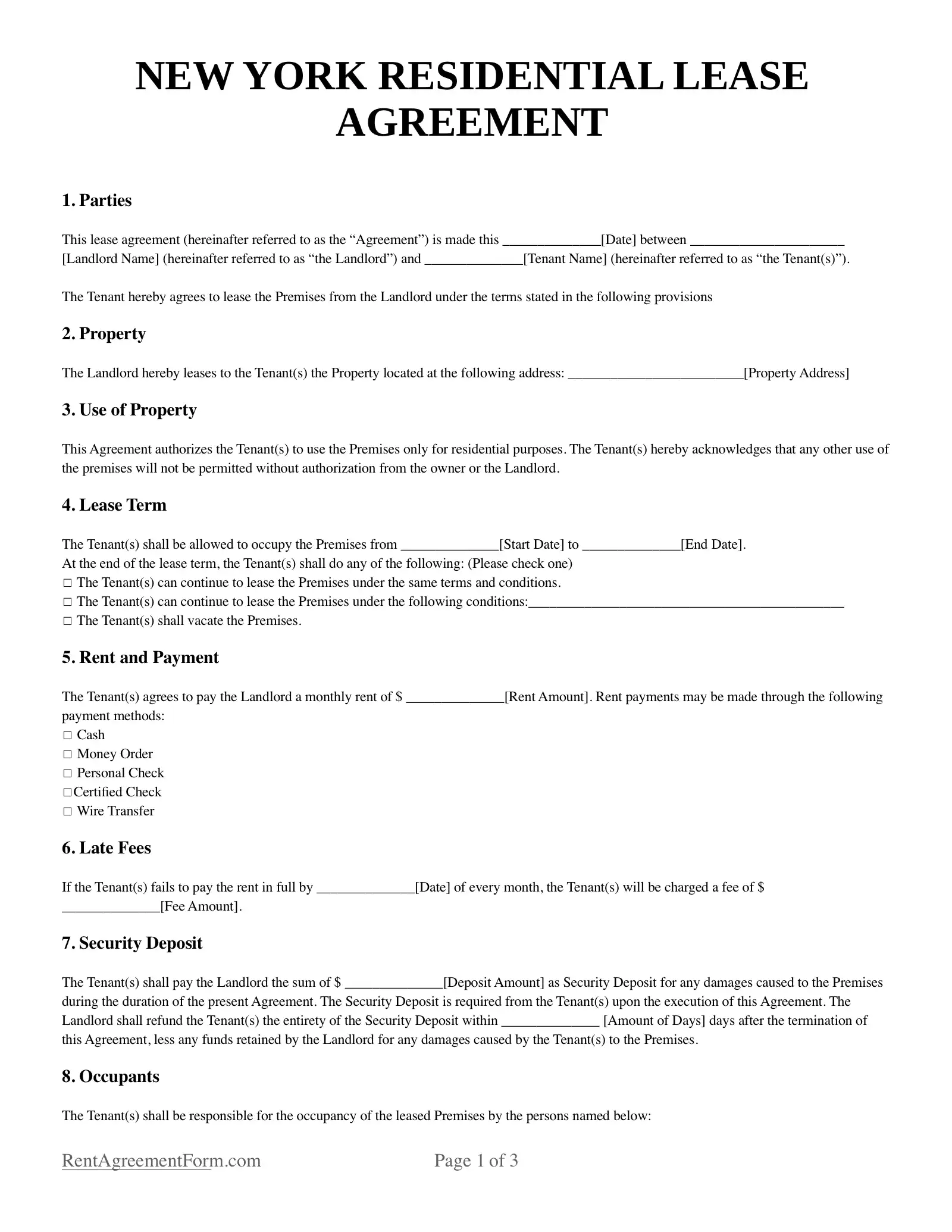New York Residential Lease Agreement Form
A New York Residential Lease Agreement Form is an essential contract between a landlord and tenant, with a relationship defined in section 711 of New York State Law. It contains all the prudent details about the temporary occupancy of the property that the landlord owns or manages.
In New York, standard rental agreements require the information of both parties—the landlord and tenant—along with all relevant terms. The tenant is obliged to pay rent for the use of the property. They are also responsible for ensuring that the property will not be willfully damaged during their occupancy.
The landlord is responsible for making sure that the property, whether it be an apartment, condo, or house, is in good condition for as long as it is leased out to the tenant.
The landlord is also obliged to provide the required disclosures on lease agreement forms, as mandated by state and federal laws.

Required Disclosures
If landlords fail to provide disclosures mandated by law, they might face legal repercussions. Here are some of the disclosures required in New York City (NYC):
Lead-Based Paint Disclosure
The federal government banned the use of lead-based paint in 1978 in U.S. Code § 4852d. If the property for rent was built before 1978, the landlord is obliged to inform the tenant. This information should be included in residential lease agreement forms.
Certificate of Occupancy
New York law states that for properties with three or fewer units for rent, the landlord must provide a tenant (or potential tenant) a certificate of occupancy. This is a document that proves that the unit is strictly for residential habitation (NY Real Prop L § 235-BB (2021)).
This mandate is required due to reports of illegal “attic apartments” in the state.
Information on Sprinkler System
Likewise, real estate law in New York states that lease agreements in New York must indicate if the property has a sprinkler system. If it does, the landlord is obliged to inform the tenant about the last time it was maintained and inspected (NY Real Prop L § 231-A (2021)).
Property’s List of Problems
All New York rentals must be livable. If there are reoccurring issues with the property, the landlord is obliged to provide the tenant with a complete list.
The landlord and tenant can do walk-throughs together, point out issues, and discuss how to solve or manage them.
Bedbug Infestation
Bedbugs are common in New York City (NYC), but tenants have a right to a bedbug-free environment. This is why NYC has an additional bedbug disclosure provision, which is for landlords to provide a tenant with a one-year history of a bedbug infestation, if applicable.
Rent Grace Period
New York has a mandated grace period of five days. This means that if the tenant fails to pay rent on time, they have five days to come up with the money before being charged a late fee. The landlord can charge a penalty of $50 or 5% of the monthly rent, whichever amount is less.
However, this charge is only legal if it was stipulated in the lease agreement.
Security Deposit Laws
There is no limit to how much a landlord can charge for a security deposit in New York. Generally, it is equivalent to a month’s rent. If the monthly rent increases, the security deposit may also be increased.
The security deposit should be placed in a trust. If the property has more than six tenants, the security deposit must be placed in an interest-bearing account. When a tenant decides to move out, the landlord may deduct “any reasonable cost” from the security deposit to spend on repairs of the property—if needed.
After deductions have been made, the landlord should return the security deposit “within a reasonable time.”